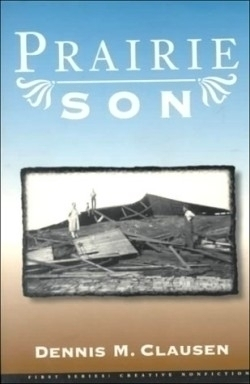Prairie Son
Prairie Son, winner of the Mid-List First Series Award for Creative Nonfiction, honors its Minnesota roots with an unflinching look at the rural, often poverty-ridden lifestyle of the twenties, thirties and forties. Where much Depression era literature repeats the now familiar version of hardship, misfortune, and starvation prevalent in that era, this tale also depicts a young man’s agonizing quest for his birth mother. Despite his adoptive parent’s abuse, Lloyd Augustine Clausen secretly searches for his biological family. It is this aspect of this story that creates suspense and freshness. Couple that with Clausen’s choice to follow creative trends toward experimental points of view and readers will discover a truly memorable nonfiction text.
Notice the names: Dennis Clausen’s decision to assume the first person point of view in his father’s voice is a risk, but one he accomplishes with authenticity and compassion. Dennis Clausen speaks Lloyd Augustine Clausen’s life in a straightforward, first person vocabulary, and in so doing creates the viewpoint that makes this bio-memoir notable. His technique allows the reader to experience directly what Clausen’s father experienced, without the distance of a traditional third person biography. In addition, by repeating the images of the plains—prairie trees, the cemetery, and an abandoned windmill—the author establishes literary resonance in a piece that might have been merely episodic. In this way, the almost atonal language typical of that era takes on a rich descriptive quality, which makes this text deeply lyrical as well as historical.
If there is one drawback to this story, it is that the personal insights—though universally appealing—are not entirely fresh. One wishes that such a daring technique could have been coupled with more original perceptions. Despite this concern, the text remains outstanding. Prairie Son will appeal to senior readers, Midwest history buffs and readers of creative non-fiction. It will be especially touching for anyone who has been a part of adoption.
Reviewed by
Anne-Marie Oomen
Disclosure: This article is not an endorsement, but a review. The publisher of this book provided free copies of the book to have their book reviewed by a professional reviewer. No fee was paid by the publisher for this review. Foreword Reviews only recommends books that we love. Foreword Magazine, Inc. is disclosing this in accordance with the Federal Trade Commission’s 16 CFR, Part 255.

